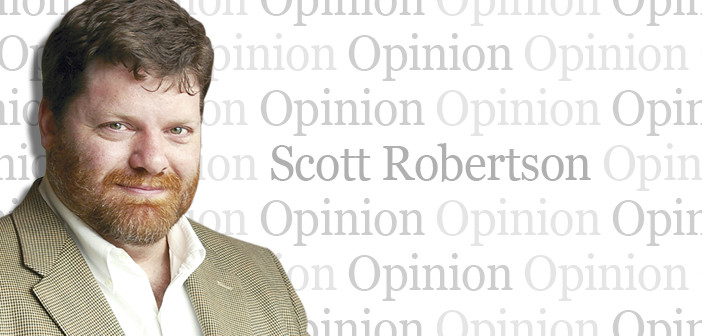By Scott Robertson
In 1948, Winston Churchill, who followed Neville Chamberlain as prime minister of Great Britain, described Chamberlain in retrospect as having been well-meaning, but overconfident considering his dearth of previous diplomatic experience. The same words accurately describe Donald Trump.
I sincerely doubt President Trump knows who Neville Chamberlain was, because if he did, he might not be so quick to tweet, “Getting along with Russia (and others) is a good thing, not a bad thing.”
Chamberlain, for those too young to recall, believed in the 1930s that appeasing Adolf Hitler was preferable to enduring open conflict with Germany. Chamberlain advocated for what he called a “double policy” of building up the British military while seeking, through diplomacy, to redress Hitler’s “legitimate grievances.”
In 1938, Chamberlain and Hitler signed what would become known as the Munich Agreement, in which Britain agreed not to pursue military action against Germany despite Hitler’s obvious appetite for international conquest.
Chamberlain then held up the document he and Hitler had signed, telling the world he held in his hand, “peace for our time.” The Munich Agreement codified the desire of the British and German peoples “never to go to war with one another again.” It was signed in September 1938. In September 1939 Britain and Germany were at war. Chamberlain’s naïve weakness had given Germany the opportunity to build its advantage until Hitler was ready to launch the Blitzkrieg on his own terms.
Striking parallels exist between German-British relations in the late 1930s and current day Russo-American relations.
Just as Germany annexed the Sudetenland, current-day Russia, seeking a return to its status as a great world power during the Cold War, has annexed the Crimea region of Ukraine.
Just as Chamberlain advocated for the rearmament of Great Britain, so too has Trump proposed great increases in defense spending, often repeating the phrase “peace through strength.” Yet at the same time, just as Chamberlain refused to admit Hitler was the greatest threat to free republics everywhere, Trump refuses to carry out the sanctions his own Congress has imposed on Russia and just this week “walked back” talk of other sanctions. Instead, Trump has congratulated former KGB Colonel Vladimir Putin on tightening his grip on political power in a country that looks more and more each day like the USSR.
Many have speculated as to why President Trump speaks loudly but carries no stick when dealing with Russia. Some say he is being blackmailed. Some say he is a coward. Some say he is merely a fool. Some even say he is right. I say only that the president is wrong in this matter, and he must be overruled by those in our government who understand the lessons of the past and possess the strength to take the actions required.
The Munich Agreement is housed today in the Imperial War Museum in London. Though the original document is preserved in the building, only an exact replica is on public display. But I have been there. I have read the words and seen what the signatures of Neville Chamberlain and Adolf Hitler look like, side by side.
More recently, I visited the National World War II Museum in New Orleans, where I was reminded of the price the world – and our nation – paid in blood and treasure for Chamberlain’s desire to “get along” with his enemy.
Those experiences brought home to me the simple truth of our situation today: We cannot – we must not – disgrace our honored dead by repeating the mistakes that emboldened and empowered their enemies.
Peace through strength? That meant something when Ronald Reagan said it. But I question whether Donald Trump understands how peace and strength are created. Appeasement of one’s enemies does not beget peace. Building a mighty military but then allowing other countries to openly attack our institutions does not show strength.
Ronald Reagan knew an “evil empire” when he saw one. Reagan stood strong where Chamberlain “got along,” Thus, Reagan succeeded where Chamberlain failed.
Donald Trump could be the next Ronald Reagan. He appears content to be Neville Chamberlain. That, I would tweet to him, is a bad thing, not a good thing.




